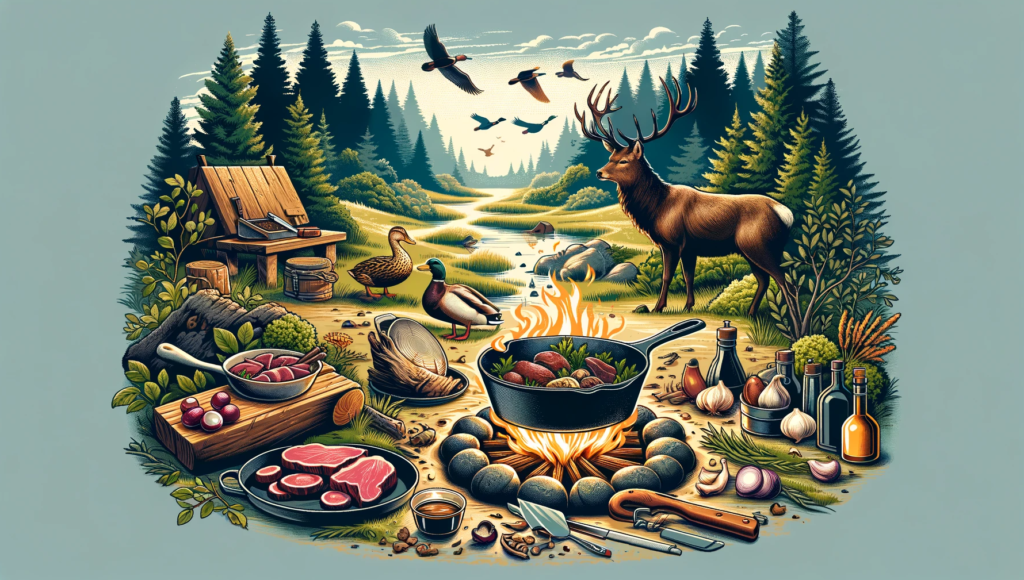
Introduction
In a world where the ordinary often takes center stage on our dinner plates, it’s time to turn our culinary compass towards the wild, untamed flavors that only game meat can offer. Wild game recipes are more than just an alternative to your standard chicken, beef, or pork; they’re an invitation to embark on a culinary adventure right in your own kitchen. At Wild Boar Outdoors, we’re on a mission to introduce you to the bold, rich flavors of venison, duck, elk, and more, transforming the way you think about and enjoy food.
Whether you’re a seasoned hunter with a freezer full of game or a curious cook looking to diversify your diet, these recipes are designed to entice, inspire, and delight. From the rugged forests and sprawling plains directly to your dinner table, let’s explore the tastes that nature generously offers. Join us as we embark on a journey to make you forget about boring old chicken and dive into the exciting world of wild game cuisine.

The Appeal of Wild Game
Embarking on the culinary adventure of wild game cooking opens the door to a world of flavors and textures that conventional meats can’t match. The distinct taste of wild game—venison, duck, elk, and others—offers a richer, more nuanced palette that can transform any meal into a memorable dining experience. But the appeal of wild game extends far beyond its taste. It’s about connecting with nature, understanding the source of our food, and embracing a healthier, more sustainable way of eating.
A Natural Alternative
Wild game stands out as a healthier alternative to traditional meats. Naturally lean, high in protein, and rich in essential nutrients like iron and B vitamins, game meat is a powerhouse of nutrition. Its lower fat content not only contributes to a healthier diet but also offers a different, often more intense, flavor profile that can elevate ordinary dishes into something extraordinary.
Sustainability and Respect for Nature
Choosing wild game also reflects a commitment to sustainability and ethical eating. Wild game is harvested from natural habitats, reducing the demand for industrially farmed meats and promoting a more balanced ecosystem. Responsible hunting and fishing practices ensure that populations are maintained at healthy levels, contributing to conservation efforts and supporting biodiversity.
In this section, we’ve journeyed through the reasons that make wild game a compelling choice for those seeking to diversify their culinary horizons. It’s not just about the hunt or the catch; it’s about bringing the rich tapestry of nature’s offerings into our homes and onto our plates, responsibly and deliciously.
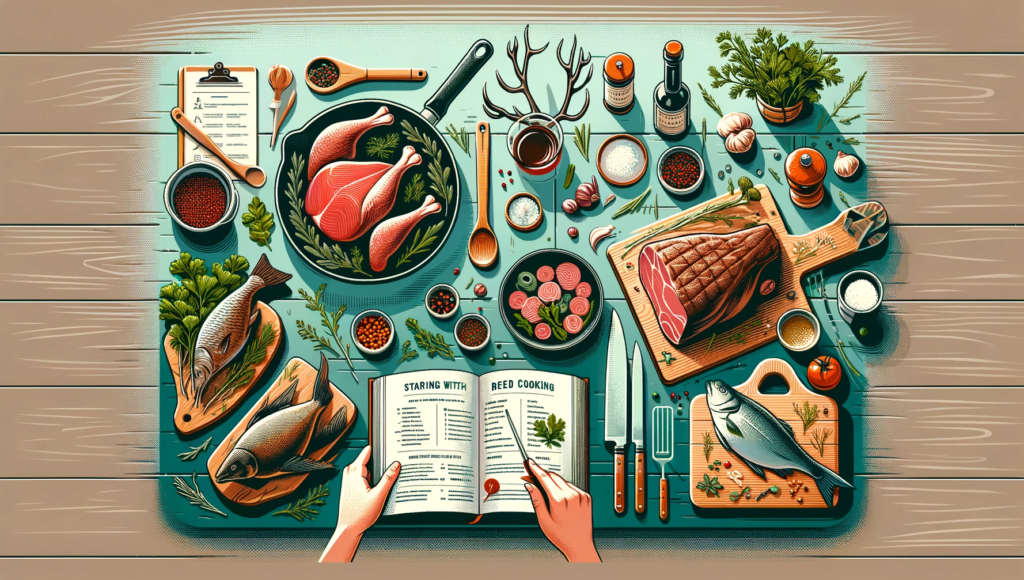
Getting Started with Wild Game Cooking
Diving into the world of wild game cooking can be as thrilling as the hunt itself, offering an array of flavors and culinary experiences unlike any other. For those new to this adventurous way of cooking, the journey from field to feast is a path of discovery, creativity, and, ultimately, enjoyment. Here’s how to embark on this rewarding culinary adventure with confidence and curiosity.
Embrace the Basics
Starting with wild game cooking doesn’t require you to be a seasoned chef. The first step is understanding the unique characteristics of each type of game meat. Venison, duck, elk, and fish each offer different flavors and textures, which can influence your choice of cooking method and seasonings. Familiarize yourself with the basics of preparing and cooking game meat, such as proper thawing, marinating, and the importance of not overcooking, especially given the lean nature of most wild game.
Equip Your Kitchen
Having the right tools at your disposal can make a world of difference. A sharp knife, a sturdy cutting board, and a reliable cast-iron skillet are essential for preparing and cooking wild game to perfection. Additionally, stocking your pantry with the right ingredients—such as kosher salt, high smoke point oils, and a variety of spices—will prepare you to tackle any recipe with ease.
Simple Recipes to Start
Begin your wild game cooking journey with simple recipes that highlight the natural flavors of the meat. Dishes like venison steaks with a simple herb rub, duck breast with a balsamic glaze, or fish grilled over an open flame are great entry points. These recipes allow the unique taste and texture of wild game to shine, without the need for complex cooking techniques or hard-to-find ingredients.
Learning and Experimentation
As you become more comfortable with the basics, don’t be afraid to experiment with different flavors and cooking methods. Wild game is incredibly versatile and can be adapted to a wide range of cuisines and dishes. Use online resources, cookbooks, and community knowledge to expand your repertoire and refine your skills.
Stepping into the kitchen with a piece of wild game is the beginning of an exciting culinary journey. With a spirit of adventure and a willingness to learn, you’ll soon discover the rich and rewarding experience that wild game cooking can offer. Whether you’re preparing a meal for yourself or sharing the fruits of your hunt with friends and family, each dish is a celebration of the great outdoors and the bountiful flavors it provides.
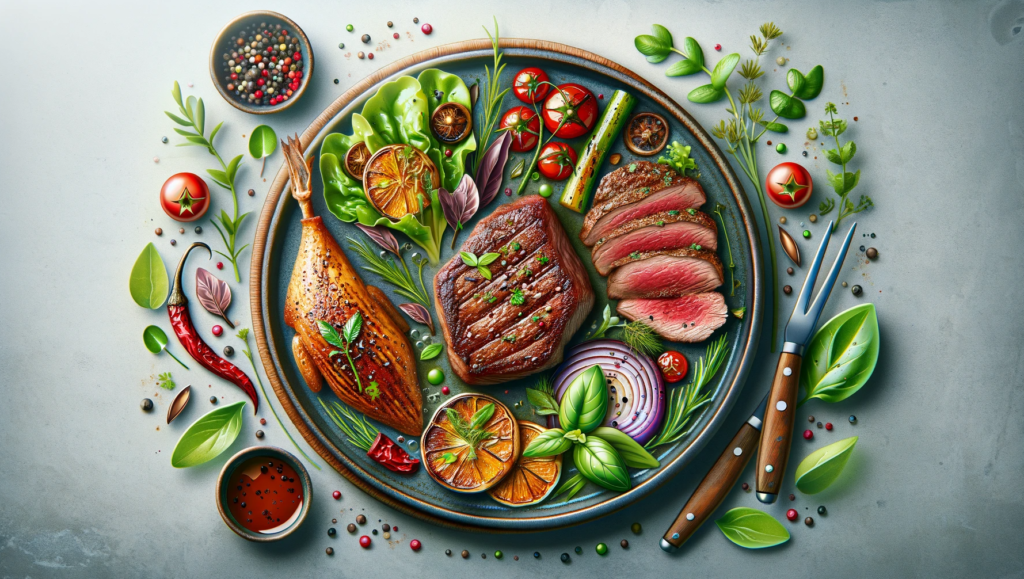
Simple Yet Flavorful Wild Game Recipes for Beginners
Embarking on your wild game cooking journey need not be daunting. With a few simple yet impactful recipes, you can create dishes that will wow your taste buds and perhaps even turn you into a wild game enthusiast. Here are three beginner-friendly recipes that showcase the versatility and depth of flavor that wild game has to offer.
1. Perfectly Seared Venison Steak
- Ingredients: Venison steaks, kosher salt, freshly ground black pepper, olive oil, butter, garlic cloves, and fresh thyme.
- Method: Begin by seasoning the venison steaks generously with salt and pepper. Heat olive oil in a cast-iron skillet over high heat. Once hot, add the steaks, cooking each side for about 3-4 minutes for medium-rare. Add butter, garlic, and thyme to the pan in the last minute of cooking, basting the steaks with the aromatic butter. Rest before serving to allow the juices to redistribute.
2. Crispy Duck Breast with Balsamic Reduction
- Ingredients: Duck breasts, kosher salt, freshly ground black pepper, balsamic vinegar, and honey.
- Method: Score the duck skin in a crosshatch pattern and season with salt and pepper. Cook skin-side down in a cold, dry skillet over medium heat until the fat renders and the skin crisps, about 5-8 minutes. Flip and cook to desired doneness, about 5 minutes for medium. Remove the duck and add balsamic vinegar and honey to the skillet, reducing to a thick glaze. Slice the duck and drizzle with the balsamic reduction.
3. Grilled Fish with Lemon Herb Butter
- Ingredients: Whole fish (trout, bass, etc.), kosher salt, olive oil, butter, lemon, fresh herbs (dill, parsley, or cilantro).
- Method: Season the fish inside and out with salt and brush lightly with olive oil. Grill over medium-high heat, turning once, until the flesh is opaque and flaky, about 10 minutes per inch of thickness. Meanwhile, melt butter and stir in lemon zest, lemon juice, and chopped herbs. Serve the fish drizzled with the lemon herb butter.
Each of these recipes brings out the unique flavors and textures of wild game, offering a delightful introduction to cooking with these meats. Not only do they promise a delicious dining experience, but they also provide a foundation upon which to build your culinary skills and explore more adventurous recipes.
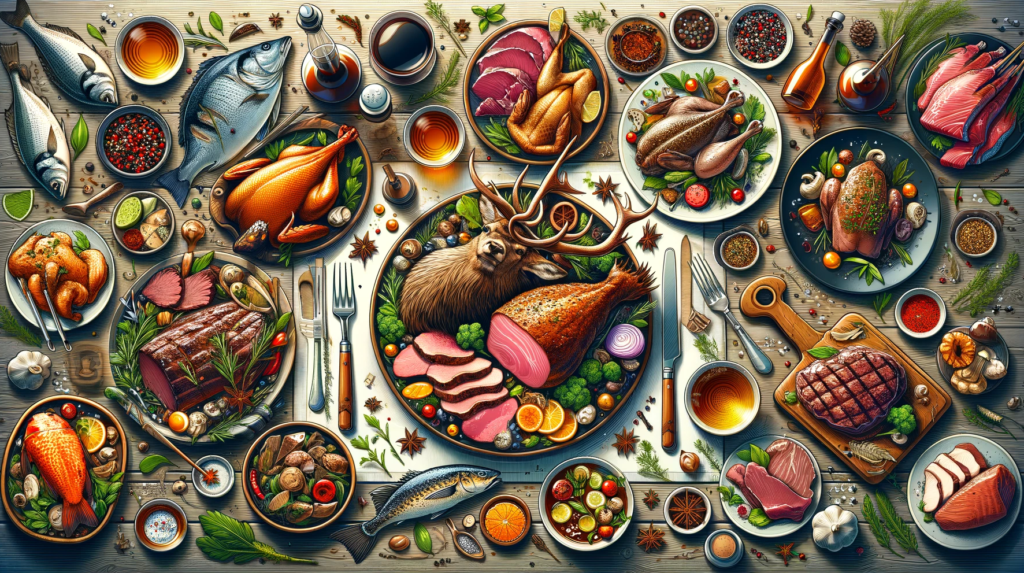
Flavors and Textures: Enhancing the Dining Experience with Wild Game
The exploration of wild game cuisine brings not just new flavors to the table, but a whole new dimension of dining experience defined by diverse textures and rich, nuanced tastes. Each type of game meat, from the robust venison to the delicate fish, contributes its unique profile, transforming ordinary meals into extraordinary culinary adventures. Here’s a closer look at how different wild game meats can enhance your dining experience.
Venison: Rich and Robust
Venison stands out for its deep, rich flavors, which are often more pronounced than those of beef. Its lean nature lends a tender texture when cooked correctly, ideally medium-rare to preserve juiciness. Venison pairs beautifully with bold seasonings and fruit-based sauces, offering a gamey yet sophisticated taste that elevates traditional dishes like stews and roasts.
Duck: Versatile and Flavorful
Duck meat, known for its versatility, offers a perfect balance between rich, fatty skin and lean, flavorful meat. The key to unlocking duck’s full potential lies in rendering its fat, which when crisped, creates a delightful contrast to the tender, juicy flesh. Duck can be prepared in numerous ways, from seared breasts to slow-cooked legs, each method showcasing its distinctively rich flavor and succulent texture.
Fish: Light and Delicate
Wild-caught fish, such as trout, salmon, and walleye, bring lightness and delicacy to the wild game spectrum. The freshness of the catch plays a pivotal role in its flavor profile, with each species offering its own unique taste and texture. Grilling or smoking are excellent ways to enhance the natural flavors of fish, complemented by simple seasonings or a squeeze of lemon to elevate the dish.
The Joy of Culinary Exploration
Diving into wild game cooking is not just about trying new recipes; it’s about embarking on a culinary journey that celebrates the diversity of nature’s bounty. Experimenting with different types of game meat allows you to explore a range of flavors and textures, from the robust and gamey to the light and delicate. It’s a journey that challenges the palate, inspires creativity, and brings the thrill of discovery to every meal.
As we continue to explore the vast landscape of wild game cuisine, let’s embrace the rich tapestry of flavors and textures it has to offer. Whether you’re a seasoned game cook or new to the experience, the world of wild game is filled with culinary treasures waiting to be uncovered.
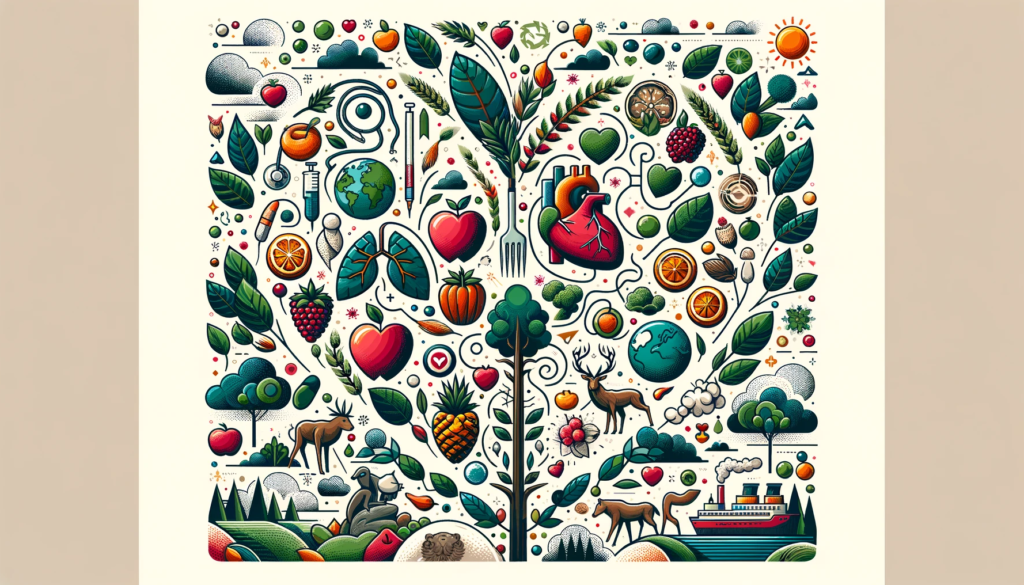
Health and Environmental Benefits of Incorporating Wild Game into Your Diet
The decision to include wild game in your diet is not just a culinary choice; it’s a step towards embracing a lifestyle that values health, sustainability, and the environment. Wild game meat offers a plethora of health benefits, while its consumption supports ethical hunting practices that contribute to the conservation of natural habitats and wildlife populations. Let’s delve into the reasons why incorporating wild game into your diet is beneficial for both your health and the planet.
Nutritional Advantages of Wild Game
Wild game meat is naturally leaner than its domesticated counterparts, offering a high-quality source of protein with lower fat content. This makes it an excellent choice for those looking to maintain a healthy diet without sacrificing flavor. Additionally, wild game is rich in essential nutrients, including iron, zinc, and B vitamins, which are crucial for energy, immune function, and overall well-being.
The absence of antibiotics and growth hormones, often found in commercially raised livestock, further underscores the health benefits of wild game. By choosing wild game, you’re opting for a cleaner protein source that’s more in harmony with the human body’s natural dietary needs.
Environmental and Conservation Benefits
Opting for wild game also reflects a commitment to environmental stewardship and sustainability. Ethical hunting practices play a crucial role in managing wildlife populations, ensuring a balanced ecosystem. Unlike industrial farming, which can have a significant impact on the environment through deforestation, water usage, and greenhouse gas emissions, hunting leaves a much smaller carbon footprint.
Moreover, sustainable hunting promotes the conservation of natural habitats, supporting biodiversity and the health of various ecosystems. By choosing wild game, consumers can contribute to these conservation efforts, ensuring that natural landscapes and wildlife populations are preserved for future generations.
A Sustainable Choice for the Conscious Consumer
Incorporating wild game into your diet represents a holistic approach to eating that connects personal health with ecological responsibility. It encourages a deeper understanding of where our food comes from and the impact of our dietary choices on the planet.
As we continue to explore the benefits of wild game, let us embrace this sustainable, nutritious, and ethically sourced option. Whether through supporting local hunters or practicing responsible hunting ourselves, we can make a positive impact on our health and the environment, one meal at a time.
This journey through the flavors, textures, and benefits of wild game cooking not only invites us to explore culinary diversity but also to consider the broader implications of our food choices. Wild game offers a pathway to connect with nature, appreciate its bounty, and take responsibility for its conservation. Let’s savor the adventure that wild game brings to our tables, and in doing so, contribute to a healthier, more sustainable world.
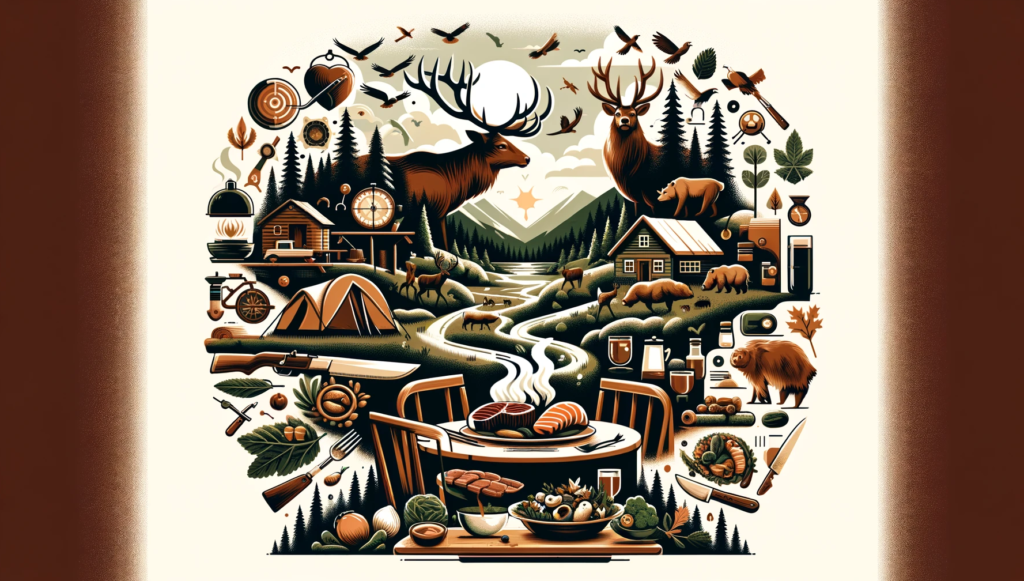
Conclusion
As we reach the end of our culinary journey through the world of wild game, it’s clear that this path is much more than a foray into new flavors and cooking techniques. It represents a deeper connection to the environment, an appreciation for sustainable living, and a commitment to healthful eating. Wild game cuisine invites us to explore the untamed beauty of nature, to understand the responsibility of conservation, and to savor the rich, diverse offerings of the wild.
This adventure, from forest to kitchen to table, embodies the essence of what it means to truly engage with our food—knowing its origins, respecting the land, and cherishing the nourishment it provides. As we incorporate wild game into our diets, we participate in a cycle of sustainability that benefits not only our health but also the planet.
Let the flavors of the wild inspire you to embrace culinary exploration, to seek out new experiences, and to make choices that support a more sustainable and healthful world. Whether you’re a seasoned hunter or a curious cook, the journey of wild game cooking is one filled with discovery, satisfaction, and a profound connection to the earth.
Wild Boar Outdoors invites you to continue this journey with us, exploring and sharing the incredible bounty that wild game has to offer. Together, let’s transform our tables into places of adventure, sustainability, and vibrant health. Bon appétit!

